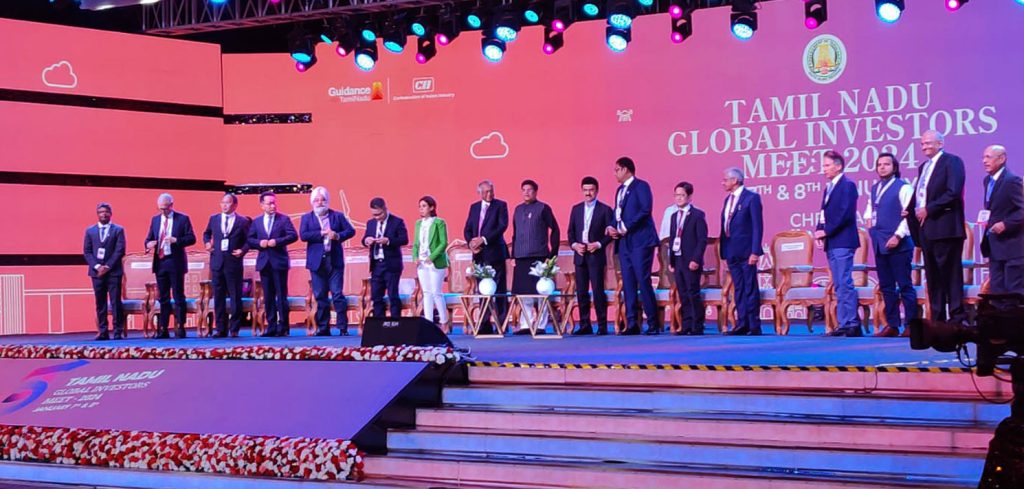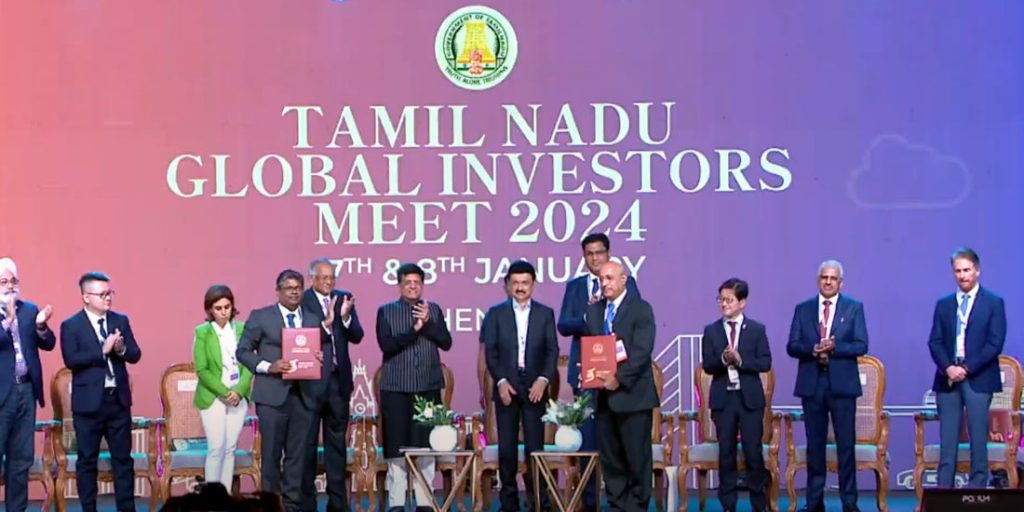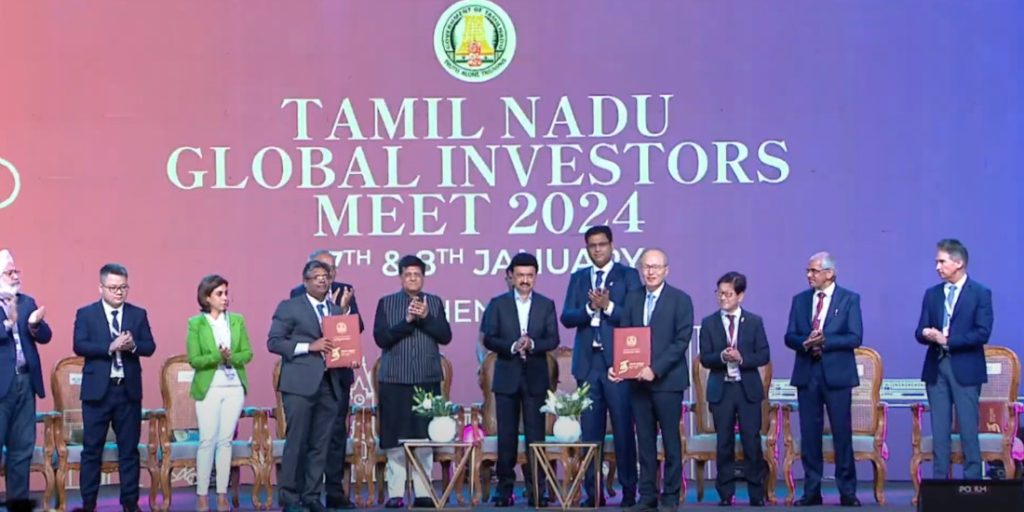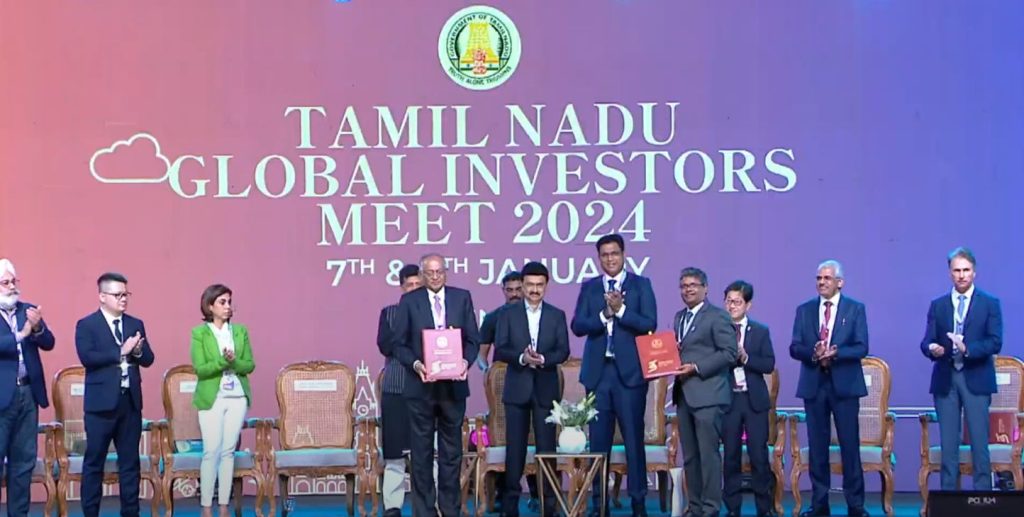
At the ongoing Tamil Nadu Global Investors Meet in Chennai, Tata Electronics, Pegatron, TVS Group and other companies have announced investments in Tamil Nadu. The TN government has set a target of attracting Rs 5 lakh crore in investments this year.
Tamil Nadu CM M.K. Stalin released ‘Vision $1 trillion’ report along with the Semiconductor and Advanced Electronics Policy, 2024 at the session attended by industry leaders and global investors.
Tata Electronics to invest Rs. 12,082 crores

Tata Electronics has signed an MoU with the Tamil Nadu government for a Rs. 12,082 crore investment to expand its existing smartphones and electronic component manufacturing facility in Krishnagiri district, generating a massive employment opportunity for 40,500 people.
Pegatron to invest Rs. 1000 crores

Taiwanese Electronics manufacturer and a major supplier to Apple, Pegatron has announced an investment of Rs. 1000 crores for expansion of its manufacturing base in Chengalpattu Disctrict in Tamil Nadu for computing, communications and consumer electronics manufacturing unit that will generate an employment opportunity for 8000 people.
Pegatron entered India in 2021 under the production-linked incentive (PLI) scheme and established its unit in Singaperumalkovil, near Chennai, with an investment of Rs 1,100 crore.

Investments from JSW Energy, TVS Group, Hyundai and others
- JSW Energy has signed an MoU to expand its footprint in Thoothukudi and Tirunelveli districts with an investment of Rs. 10,000 crores, generating an employment opportunity for 6,600 people
- TVS Group has signed an MoU to expand its footprint in automobile, realty, and IT with an investment of Rs. 5,000 crores
- Mitsubishi Electric India has signed an MoU to expand its existing footprint of AC manufacturing facility in Gummidipoondi with an investment of Rs. 250 crores. This is proposed to employ 60 percent women
- Hyundai has signed an MoU to set up ICE & EV passenger car and EV battery manufacturing unit in Kacheepuram District with an investment of Rs. 6180 crores. It will also set up a Hydrogen Innovation Valley with IIT Madras.
Inaugurating the Tamil Nadu Global Investors Meet (TNGIM) 2024 at Chennai Trade Centre, Nandambakkam, the Chief Minister of Tamil Nadu Thiru M.K. Stalin shared his vision for transforming Tamil Nadu into a $1 trillion economy by 2030 and said that this Global Investors Meet will act as a catalyst for economic and industrial growth.
With the aim that Tamil Nadu should play an important role in shaping India’s economic growth, I have set an ambitious target of transforming Tamil Nadu’s economy into a 1 trillion USD economy by 2030. To achieve this, we are pursuing a twin-pronged approach of attracting both capital and employment-intensive investments
We offer what we promise. We have been inviting investors with a red-carpet welcome. We want to be the trendsetter amidst other states. TNGIM has witnessed encouraging response and is expected to bring pride and investment to Tamil Nadu. Multiple policies have been announced by the state. Our focus is to ensure development for all.
Speaking on the occasion, Shri Piyush Goyal, Minister of Commerce & Industry, Consumer Affairs & Food & Public Distribution and Textiles, Government of India and Leader of House in Rajya Sabha said:
India’s growth is backed by the success of its states and Tamil Nadu stands as a pivotal cog in the wheel. Tamil Nadu is one of the most ambitious states with the vision of $1 trillion economy by 2030 and the government of India is working closely with the state government towards taking the state’s inclusive and sustainable growth forward.
Dr. T.R.B. Rajaa, Minister for Industries, Investment Promotion, and Commerce said,
At the Tamil Nadu Global Investors Meet 2024, we aspire for a bigger, better future, with a focus on inclusivity and sustainability. This summit is a pedestal for the state to showcase the sectoral expertise, enhance and strengthen skilling diversity and expand the investment opportunities both nationally and internationally.
Tamil Nadu’s skilling prowess exceeds the national benchmark by contributing 43% of the total women workforce in India.
